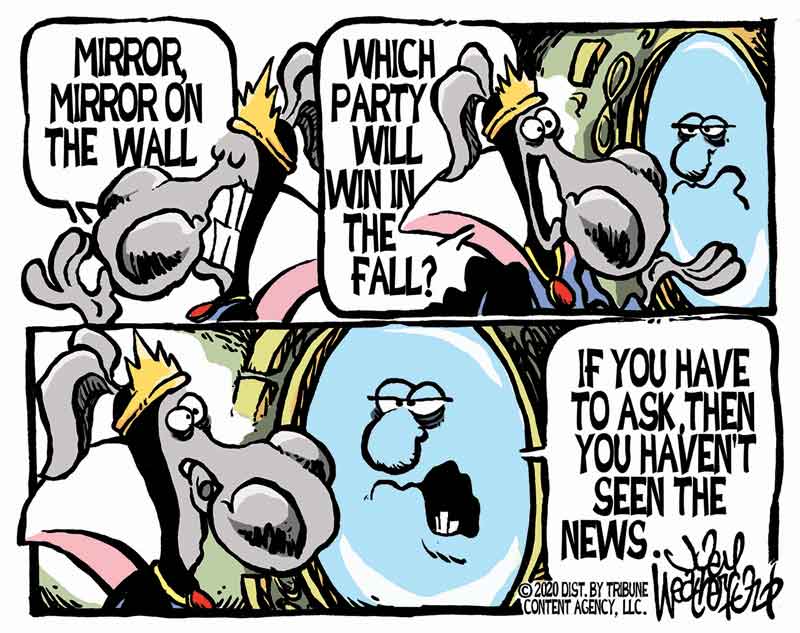
Both historical patterns and recent polling strongly suggest that Republicans could win a decisive margin in the House of Representatives with the midterm voting in November. Shortly thereafter, the empowered GOP could disband the House select committee, despite united Democratic opposition – just as House Speaker Nancy Pelosi's Democrats commissioned it in the first place with only two Republicans willing to participate.
Before that partisan switch stops or redirects the congressional inquiry, the nation deserves a serious effort to confront Trump, personally, over his role in summoning the "Stop the Steal" protesters to Washington, dispatching them up Pennsylvania Avenue toward the Capitol, and then reacting to their depredations after they had begun battling police and ransacking the building.
In that context, few of those who question the pro-Trump bona fides of the bulk of the rioters pause to ponder an obvious question: If leftist activists really did mount an elaborate charade to discredit a president they loathed, wouldn't they have arranged this effort to influence voters before at least 150 million Americans cast their ballots, rather than waiting till two months after Election Day to stage their big, violent show?
A recent Supreme Court decision makes more than 700 pages of White House papers available to the select committee investigators, according to NBC News, shedding significant light on the plots and plans of Trump and his closest allies in the days immediately preceding the Capitol insurrection, but they can't help the tormented and confused public place the incident in a meaningful perspective.
Were the hundreds who participated in the long, brutal battles that injured 140 law enforcement officers an impassioned mob intoxicated with violence, or a fearless phalanx of determined patriots willing to risk their own well-being to undo a fraudulent election?
Why didn't Trump walk to the Capitol and other lingering questions for him Convincing answers to such queries only become possible with Trump's personal participation, demanded both by history and the needs of an informed electorate for 2024.
With his widely expected bid for another term in the White House, it's essential to evaluate his high-pressure performance in one of the most painful predicaments of his turbulent presidency
For instance, how would Trump explain his publicly announced pledge to hike alongside his backers on their march to the Capitol, followed by his utterly unexplained failure to stroll even a few yards with the faithful who trusted his every word. In his long speech at the Ellipse only an hour before the fighting began, he declared: "We're going to walk down – and I'll be there with you. ... We're going to walk down Pennsylvania Avenue ... and we're going to the Capitol."
Did the president somehow change his mind about walking together with Oath Keepers and Proud Boys on that fateful day, or had he intentionally misled the crowds all along. And if he did alter his intentions, what led him to the change?
Along the same lines, had he anticipated a violent confrontation, weeks in advance of the "big protest" he enthusiastically promoted? On Dec. 19, Trump tweeted: "Big protest in D.C." on Jan 6. "Be there, will be wild." Did the promise of wildness suggest at least the possibility of physical strife and the bold defiance of authority?
Most important, why did the president wait three hours, as he reportedly watched the invasion of the Capitol on live TV, according to The Washington Post, before he issued any public statement asking the multitudes fighting in his name ("Fight for Trump!" they repeatedly chanted) to cease and desist to allow the restoration of public order.
When he finally issued a pre-taped video that quickly ended the fighting, it bore an edge of grudge and grievance that no one could describe as unifying. "I know your pain, I know you're hurt," he began. "We had an election that was stolen from us. … There's never been a time like this where such a thing happened, where they could take It away from all of us. From me, from you, from our country. ... We love you, you're very special."
Does the president still consider the rioters "very special," and why did he express his love for them even before calm had returned to Capitol Hill?
'I ALONE CAN FIX IT'
In fact, he has continued to express that love for more than a year after the bloody events of Jan. 6, 2021, while decrying the still unfolding legal consequences. He recently told an enthusiastic rally crowd in Conroe, Texas, that if he wins back the presidency in 2024, "we will give them pardons because they are being treated so unfairly."
Presumably, this exoneration would include the more than 200 defendants who have already pleaded guilty to various offenses.
In any event, it signals Trump's intention to continue talking about that dark, violent day for the next couple of years. In that context, the public deserves to hear his side of the story directly from the ex-president, and the only way for him to provide that perspective is to face crucial questions from the select committee or Justice Department prosecutors.
In accepting the Republican presidential nomination in 2016, the newly anointed nominee famously said: "I alone can fix it." Now, at another hinge point of his career, an increasingly weary populace can rightly demand: Trump alone can answer.
Michael Medved, a member of USA Today's Board of Contributors, hosts a daily, syndicated talk radio show and is author, most recently, of "G od's Hand On America: Divine Providence in the Modern Era." (Buy it at a 53% discount! by clicking here or order in KINDLE edition at just $12.99 by clicking here. Sales help fund JWR.)


 Contact The Editor
Contact The Editor
 Articles By This Author
Articles By This Author